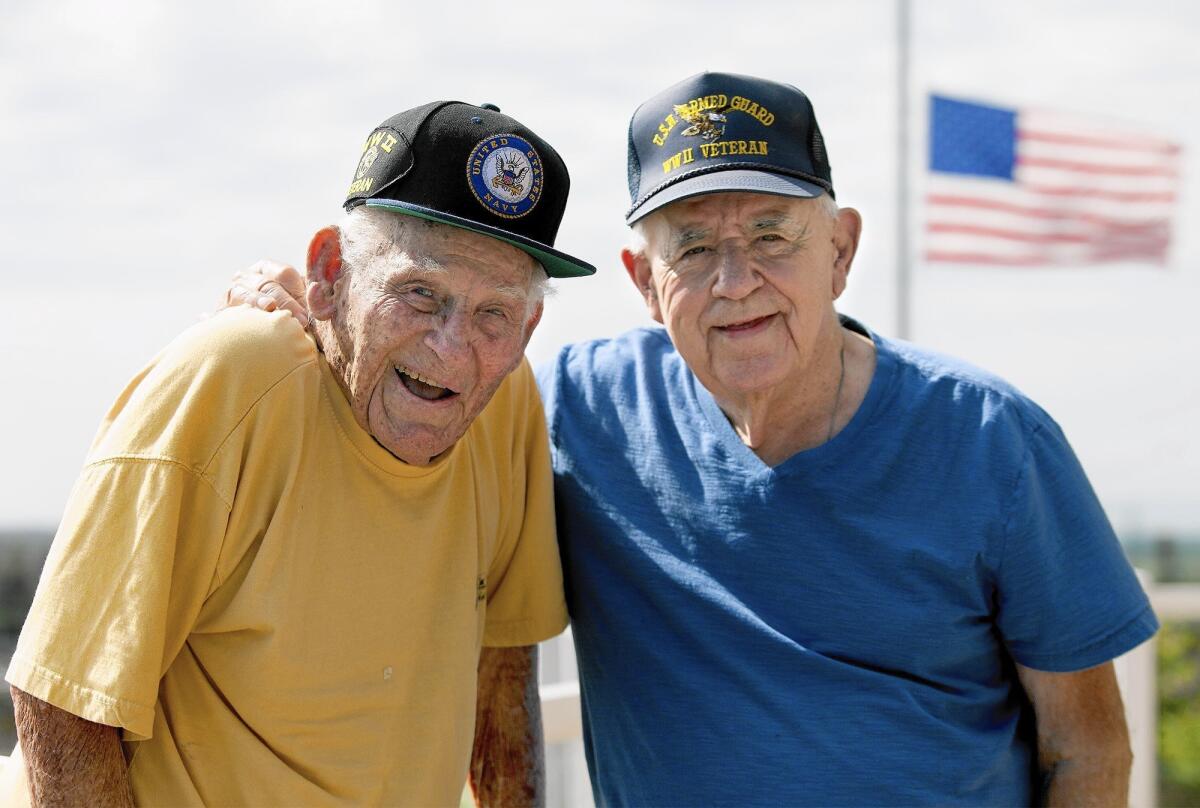WWII vets ready for their first trip to D.C. memorials

Longtime Costa Mesa resident Gale Bouk and friend Howard Davis will board an airplane in San Diego Friday morning and disembark in the nation’s capital to see a corner of Washington made just for them.
For the U.S. Navy veterans who served in the Pacific theater, their journey to the National World War II Memorial promises to be an emotional one, especially since neither Bouk, 94, nor Davis, 90, has seen the memorial before.
The trip is being organized by the Honor Flight Network, an Ohio-based nonprofit that coordinates and raises funds for veterans to travel to Washington so they can see their respective war memorials. Bouk and Davis will travel free alongside about 80 other veterans with the help of Honor Flight’s San Diego chapter
At first, Davis, of Santa Ana, wasn’t interested in the idea. But when he heard Bouk was up for it, he changed his mind.
“I’m sure we’re gonna have some fun,” Davis said.
“I say, ‘Put me down. I’ll go,’” Bouk recalled telling his daughter, Chris Steward, who filled out his Honor Flight application.
“It will be quite an experience,” he added.
Bouk — who calls his old friend “Howie” — said he’s usually pretty stoic, but the Honor Flight got him quite excited.
“He couldn’t hardly talk, he was so happy,” Bouk said. “And you don’t make him too happy all the time like that.”
Bouk and Davis first met in the 1960s while living in Costa Mesa’s Lower Birds neighborhood. Their respective families grew close and have always kept in touch, even though they don’t live on Phalarope Court anymore.
Bouk later moved to the Westside, to a home on Gleneagles Terrace overlooking Talbert Regional Park. From there, he’s been able to actively monitor his neighbors’ flagpole and remind them if their American flag needs replacing. That flag, he notes, is the first and last thing he sees every day from his bedroom.
Bouk, the son of a Hollywood stuntman, enlisted soon after Pearl Harbor. He served with the Navy as an aerial gunner on torpedo and dive bomber airplanes, and with an aircraft carrier crew that assisted airplanes’ takeoff and landings.
Bouk witnessed many Pacific theater campaigns, from Guadalcanal in 1942 through Okinawa in 1945.
At Okinawa, Bouk recalled, kamikazes slammed into his ship’s deck.
“Damn near sank us,” he said. “It took us two days to get the fires out.”
Following the war, he said, “I didn’t want anything more to do with the South Pacific.”
Bouk later co-founded a plastics extrusion company with his brother-in-law before selling it and retiring.
Davis enlisted at age 17 and had his 18th birthday in boot camp. He got assigned as a gunner for the Navy’s Armed Guard, which defended U.S. and allied merchant ships against enemy submarines, ships and aircraft. It was considered a particularly dangerous assignment.
Aboard different vessels, Davis traveled throughout the world: Guadalcanal, Australia, India, Alaska, the Russell Islands, New Caledonia.
“Too many trips,” Davis said. “The ocean was pretty, but we knew what was underneath it.”
“You got that right, baby. And on top of it too,” Bouk chimed in. “Both ways.”
After the war, Davis graduated from USC and worked as a contract administrator in the airplane industry.
Neither man talked extensively about his wartime experiences in the years following. Like many veterans, recalling those days is still painful.
When asked what he’ll think about when seeing the World War II memorial, Davis, clinching his old dog tags, said he’ll be thinking about the people he served with.
“Buddies,” he said. “Buddies.”
